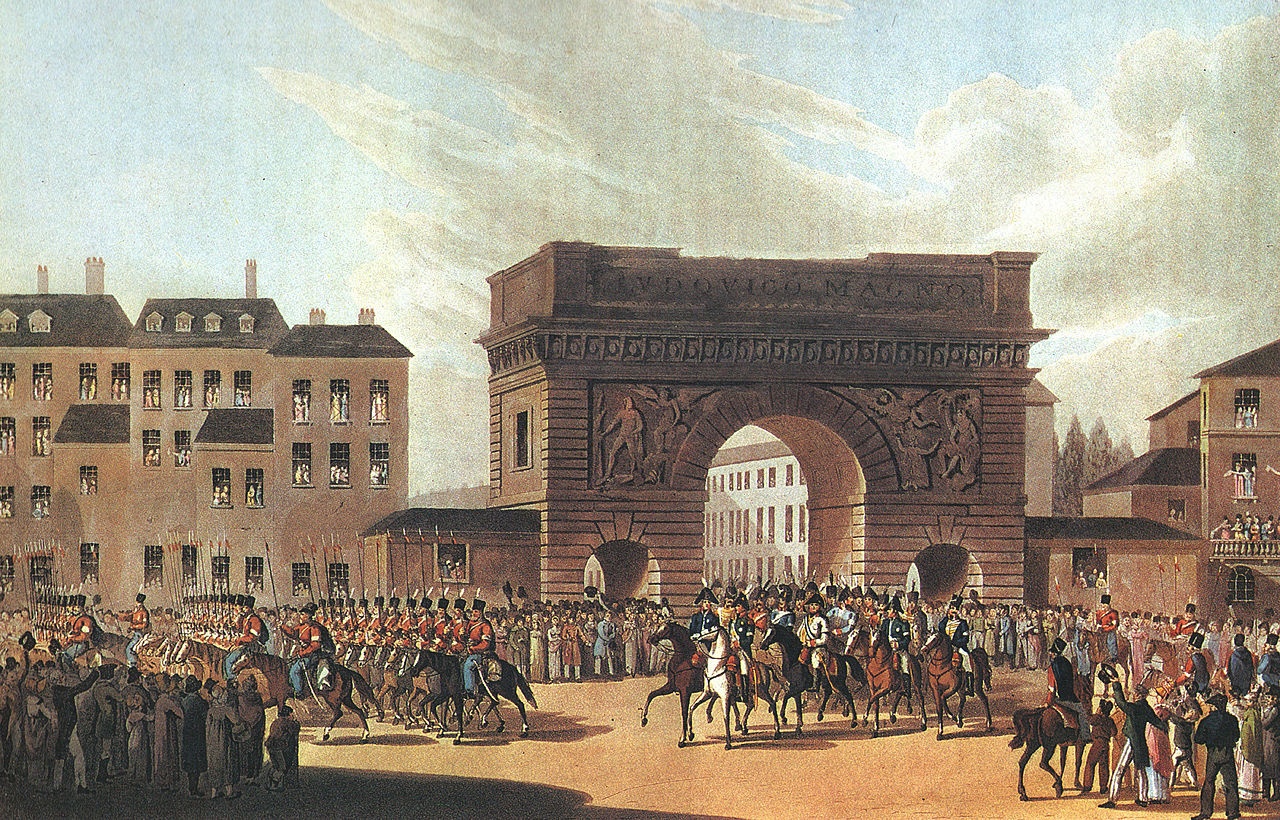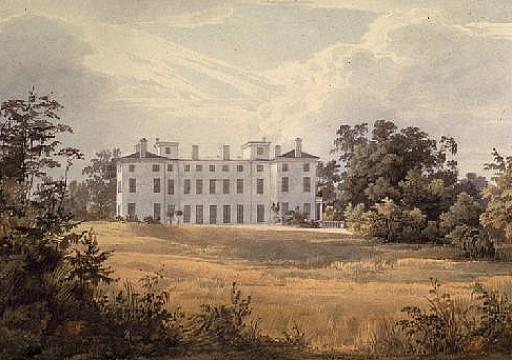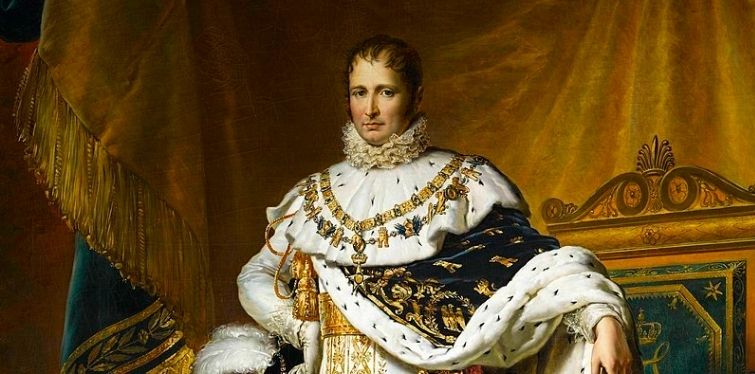Over the next few months we are embarking on a blog series about Napoleon’s brothers. We start with Joseph, the eldest of the Bonaparte brothers. Despite being Napoleon's senior, Joseph is often in the shadow of his younger brother and is perhaps best known as the hapless King of Spain between 1808 and 1813. In fact, he was a competent politician and diplomat in his own right who played a major role in his brother’s rise to power and exercise of it.
Giuseppe di Bounaparte was born on 7 January 1768 to Carlo Buonaparte and Letizia Ramolino. At the time Carlo was serving as secretary to Pasquale Paoli, the Corsican nationalist leader who had attempted to establish an independent republic free from Genoese rule. Giuseppe was born in Corte, Paoli’s capital. However, the following year Corsica was sold to France and Paoli’s forces defeated. Carlo soon reconciled himself to French rule. Henceforth, Giuseppe was Joseph though the Buonapartes would not become Bonapartes until the turn of the century.
Carlo (now Charles) and Letizia’s second surviving child, Napoleon, was born in Ajaccio nineteen months after Joseph in August 1769. Although Joseph would have six more siblings, the two elder brothers enjoyed a particularly close relationship as they were growing up. In 1778, Joseph, Napoleon and their sister Elisa accompanied their father to France for their education – Joseph intended for the clergy, Napoleon for the army. While a talented student, Joseph was not at all keen on the priesthood and sought a military career like his younger brother.
Charles Bonaparte’s early death in 1785 forced Joseph to return to Corsica and assist his widowed mother in managing the family estate. He decided that he would become a lawyer and began to practise in Ajaccio in 1788, having studied at the University of Pisa where he was attracted to the enlightenment ideas of popular sovereignty and the rights of man.
These ideas would find themselves centre stage in the French Revolution of 1789, and Joseph and Napoleon became prominent supporters of the Revolution in Corsica. In 1790, General Paoli returned to Corsica and was elected President of the Department of Corsica. The Bonaparte brothers had regarded Paoli as a hero but political differences soon emerged. In 1793, Paoli was horrified at the executions of the French royal family and signed an agreement with Britain. The Bonapartes were forced to flee to France.
Letizia and most of the family settled in Marseille, where in 1794 Joseph married Julie Clary, the daughter of a rich merchant, while Napoleon was engaged to Julie’s younger sister, Desirée (though the engagement would be broken when Napoleon married Josephine de Beauharnais.) The political situation was volatile and initially the Bonaparte brothers were supporters of Robespierre’s Jacobin government, but managed to escape the crackdown on the Jacobins following the Coup of Thermidor in 1795. By 1796 Napoleon was made commander of the Army of Italy and fought a brilliant campaign to defeat the Piedmontese and Austrians. Joseph briefly joined his brother in Italy and then accompanied an expedition to retake Corsica from the British. He was welcomed enthusiastically and duly elected to the Council of Five Hundred – the lower legislative chamber – as a representative for the island.

Julie Clary (left) and her sister Desirée
It was evident that by this time Joseph had been overshadowed by his younger brother. Through Napoleon’s influence, he was appointed ambassador to the Duchy of Parma in March 1797, but this posting would last just over a month before Joseph became ambassador to the Papal court in Rome in May. While the Revolutionary Government was keen to de-escalate tensions with the Pope, an armed insurrection on 28 December 1797 caused Joseph to leave the city. Napoleon later ordered General Berthier, his chief of staff, to lead an army to occupy Rome in February 1798.
Back in Paris, Joseph returned to the Council of Five Hundred while General Bonaparte went on his famous and ultimately ill-fated Egyptian campaign. The Directory – the French government of the time – had been alarmed for some while at Bonaparte’s popularity and aimed to sideline him. News of victories in the shadow of the Pyramids only served to boost Napoleon’s reputation. Joseph dutifully defended his brother in the political area in Paris while Napoleon was on campaign. When the latter returned to France in late 1799, Joseph helped to ensure that prominent politicians would support – or at least not actively opposite – the Coup of 18 Brumaire which saw Napoleon emerge as First Consul of the Republic.
Although Joseph would have been content being a country gentleman on his estate of Mortefontaine a short distance from Paris, Napoleon’s rise to power saw him involved in affairs of state. After appointing Joseph to the Council of State, Napoleon gave Joseph a series of diplomatic assignments. This was not so much due to Joseph’s diplomatic skills and experience, which were limited, but because he was one of the few people the First Consul could trust on such matters. Making peace with France’s enemies was essential so Napoleon could focus on his domestic agenda.

Joseph's chateau at Mortefontaine
Joseph led negotiations with the United States to resolve the issues which had led to the Quasi-War of 1798-1800. The ensuing Treaty of Mortefontaine of September 1800 improved relations between the two countries and paved the road for the Louisiana Purchase of 1803. Not long afterwards, Joseph negotiated with the Austrians at Lunéville after they were defeated by General Moreau’s Army of the Rhine at Hohenlinden in December 1800. The Treaty of Lunéville was signed on 9 February 1801, which largely confirmed the previous peace of Campo Formio negotiated by Napoleon himself in 1797.
Joseph’s greatest challenge would come later in 1801 when he met with Lord Charles Cornwallis – the same man who had surrendered at Yorktown in 1783 – to discuss peace with Britain. The two men established a working relationship around a sincere desire for peace, though negotiations were sometimes derailed by Napoleon’s personal intervention. In the end Britain agreed to hand back most of the colonies the Royal Navy had seized from France and her allies, return Malta to the Order of St John, while France agreed restore Egypt to the Ottomans. These terms would soon prove a little too hard to swallow for London, but the conclusion of the Treaty of Amiens on 27 March 1802 resulted in widespread celebrations in both Britain and France.

Joseph Bonaparte and Charles Cornwallis at the signing of the Treaty of Amiens
When Napoleon became Emperor in 1804, he named the son of his younger brother Louis as successor. This angered Joseph, who argued that as the elder brother, he should be first in line should Napoleon remain childless. Napoleon attempted to make Joseph King of Lombardy in return for excluding himself from the succession. The offer was declined.
Yet it would not be too long before Joseph did become a King. In 1805 – days after signing a treaty of neutrality with Napoleon – the Kingdom of Naples had joined Britain and Austria in its war against Napoleonic France. After Napoleon’s great victory at Austerlitz in December of that year, he turned his attention to King Ferdinand IV of Naples. Joseph had already been sent to Rome to take nominal command of an army of 40,000 men intended for an invasion of Naples. In reality Marshal André Masséna was in charge of military operations. With the Austrians and Russians evacuating the peninsula and the royal family evacuated to Sicily by the Royal Navy, Masséna met little resistance and entered Naples on 14 February 1806, and the Neapolitan Army was comprehensively defeated less than a month later. On 30 March Joseph was named King of Naples by Napoleon.
As King of Naples, Joseph soon assembled a team of competent French and Neapolitan ministers to help him reform the administration of the kingdom in the French model. Much of this programme was entrusted to the Minister of Interior, André-François Miot, later enobled as the comte de Mélito. Feudal privileges were abolished in favour of meritocracy, new schools and colleges established, and major infrastructure projects undertaken. Although Joseph proved popular in his kingdom and the reforms helped to boost the Neapolitan economy, he was also unable to fully pacify the country, with pockets of resistance holding out supported by the British navy.

King Joseph of Naples
King Joseph owed his throne to his brother and had to act according to Napoleon’s wishes. When Napoleon defeated Prussia in October 1806 and issued the Berlin Decree banning trade with Britain, Joseph was obliged to follow suit. In a letter to Joseph from Warsaw in January 1807, the Emperor wrote: “Your destinies and my successes have placed a vast country between us. You touch, on the south, the Mediterranean. I touch the Baltic. But, by the harmony of our measures, we are seeking the same object. Watch over your coasts; shut out the English and their commerce. Their exclusion will secure tranquillity in your states.”
By the summer of 1808, Joseph had been King of Naples for over two years. There is no doubt that state administration had improved since he became king and the population was better off as a whole. Even so, he was unable to prevent himself from being regarded as an outsider who had been imposed on the kingdom by armed force. Joseph remained reliant on the French garrison, now under the command of Laurent Gouvion St-Cyr. He also found it challenging to meet Napoleon’s demands, many of which were unrealistic, and often found himself criticised in his brother’s letters.
Nevertheless, Napoleon seemed to believe that Joseph had done a good enough job in Naples, and in May 1808 ordered him to depart for the city of Bayonne on the French side of the Pyrenees. There, under the pretext of mediating between King Carlos IV and his son Fernando VII – rival claimants to the Spanish throne during a period of upheaval – Napoleon arrested both kings and decreed that Joseph would replace them as King of Spain. The new King was by no means pleased to receive his new throne, but faced with a collection of Spanish nobles pleading for him to accept, he did so. His old Kingdom of Naples was given to Marshal Joachim Murat, who was married to his sister Caroline.
After a constitution was promulgated under French influence, Joseph entered Spain on 9 July. Despite 80,000 French troops in Spain, Joseph was dismayed to see that much of the country had risen against French rule. Unlike in Naples, where the rebels were quickly suppressed and confined to coastal enclaves, Spain was far larger and required a much more significant presence. Many Spaniards regarded Joseph as ‘el rey intruso.’ Furthermore, the British had a far stronger foothold on the Iberian Peninsula than the Italian one.
This is not the place to go into great depth about the Peninsular War. In the summer of 1808 Napoleon was still under the impression that the rebels in Spain could be supressed easily. He only recognised the severity of the situation when General Junot’s Army of Portugal had been defeated by General Sir Arthur Wellesley’s British force at the Battle of Vimeiro and forced to evacuate the peninsula. Napoleon took personal command of an army of 100,000 men to drive British forces out of Spain. This was accomplished when the British force evacuated from Corunna in January 1809. By then Napoleon had already left to deal with more pressing matters in central Europe. However, the British would be back. Napoleon wouldn’t.
In theory, Joseph had nominal command over all French troops in Spain. In practice, any military matters were devolved to Marshal Jean-Baptiste Jourdan, one of the most distinguished generals of the Revolutionary Army and a close friend of King Joseph. However, the commanders of the French armies in Spain preferred to report directly to Napoleon and treated their areas of operation as personal fiefdoms. This allowed General Wellesley and his Spanish allies to manoeuvre against each French army separately. On 28 July 1809, Wellesley and General Gregorio de la Cuesta defeated Joseph and Jourdan at Talavera in a hard fought battle, which earned the British general the title of Viscount Wellington. However, the British commander was not yet equipped to take on the other French armies which were beginning to coordinate their movements.

King Joseph of Spain
From Madrid, Joseph did what he could to bring about social and political reforms similar to the ones he had introduced in Naples. He famously abolished the Spanish Inquisition, though the institution had lost much of its notoriety by then. The impact of these reforms naturally only extended to the territories controlled by French forces, which changed on a daily basis. In the presence of French troops, where they were absent, the people labelled him ‘Pepe Botellas’ (Joe Bottles), a caricature which continues to shape Spanish memory, though he was not a heavy drinker.
There is little doubt that Joseph tried his best to make things work, but he was faced with an insurmountable task in Spain. The partisan war in Spain was notoriously brutal, with both sides guilty of atrocities against the other. Joseph was personally horrified at such acts of brutality, but could do little to stop it. While Napoleon complained to Joseph that he was not doing enough send men and money to the imperial coffers, Joseph complained that he did not have sufficient resources to carry out the task of governing Spain. The relationship between the two brothers would decline over the ensuing years as Wellington’s army gradually grew stronger relative to the French military presence.
By 1812, Wellington was confident enough to invade Spain, forcing Marshal Marmont’s Army of Portugal to retreat in front of him. In July 1812 Marmont was defeated decisively at Salamanca, forcing Joseph to hurriedly abandon Madrid, which was occupied by the British. Although Wellington would be bogged down at the siege of Burgos and chose to retreat to Portugal, it was the beginning of the end. The following year, Wellington was back in Spain and decided to head straight to the Pyrenees. Three French armies united under Joseph and Jourdan’s command to confront Wellington at Vitoria on 21 June 1813. Wellington won a decisive victory, and during the retreat captured the French baggage train, including Jourdan’s marshal’s baton, and a large collection of Old Master art looted from Spanish palaces.
Napoleon had already considered removing his brother from the Spanish throne, but after Vitoria, he recognised the reality and in November 1813 signed the Treaty of Valencay with King Fernando, allowing him to return to Spain and retake the throne. Napoleon hoped that this might persuade the Spanish to break their ties with Britain, and under the terms of the agreement Fernando was to marry Joseph’s 13 year old daughter Zenaide. Thankfully for her, this never came to pass. Following his abdication, Joseph returned to his estate at Mortefontaine.
In spite of Napoleon’s disappointment at Joseph’s performance in Spain, he entrusted him with the defence of Paris during the 1814 campaign as Lieutenant General of the Empire. Once again Joseph failed to meet his brother’s expectations. As the allied armies approached the suburbs of Paris at the end of March, Joseph ordered Marshals Marmont and Mortier to offer some resistance, but once allied troops took control of Montmatre he could see the game was up. He advised Empress Marie Louise to flee with her son and the rest of the government. On 30 March, after Marmont informed him that further resistance was futile and the city was at risk of bombardment, Joseph convened a council which decided to capitulate. He attempted to join Marie Louise but was cut off by enemy forces. Following Napoleon’s abdication, he left for Switzerland.

The allied entry into Paris
In 1815 Joseph returned to Paris during the Hundred Days, but escaped to the United States after Napoleon’s defeat, assuming the name the Comte de Survilliers in an attempt to remain incognito. He bought the large estate of Point Breeze near Bordentown, New Jersey, where he received many of the leading American politicians of the day including John Quincy Adams, Daniel Webster and Henry Clay. In 1824, when the Marquis de Lafayette visited the United States, he communicated his disgust of the Bourbon monarchy and requested support in a venture to make Napoleon’s son, the Duke of Reichstadt, King of France – believing that only a Bonaparte on the throne could restore the legacy of the French Revolution. Joseph declined to move at that point, but saw an opportunity following the overthrow of King Charles X in France in 1830. He wrote to Marie Louise and Emperor Francis requesting support from the Austrian court for the candidacy of Napoleon II. In 1832, when he learned that his young nephew was seriously ill, Joseph crossed over the Atlantic seeking to meet with him, but learned of his death when he arrived in Liverpool.

The Point Breeze estate
Joseph was now the Bonapartist heir to the French throne, but he had no interest in seeking his claim. He sought to return to France, or at least to Italy to join his family, but was denied by the French and Austrian courts. He spent the next few years in London, making a couple of extended trips back to the States. After suffering a stroke in 1840, he was finally allowed to move to Italy to join his family, and died in Florence on 28 July 1844.
If you enjoyed this blog post, check out our Joseph Bonaparte cartoon mug!




Share and get 15% off!
Simply share this product on one of the following social networks and you will unlock 15% off!